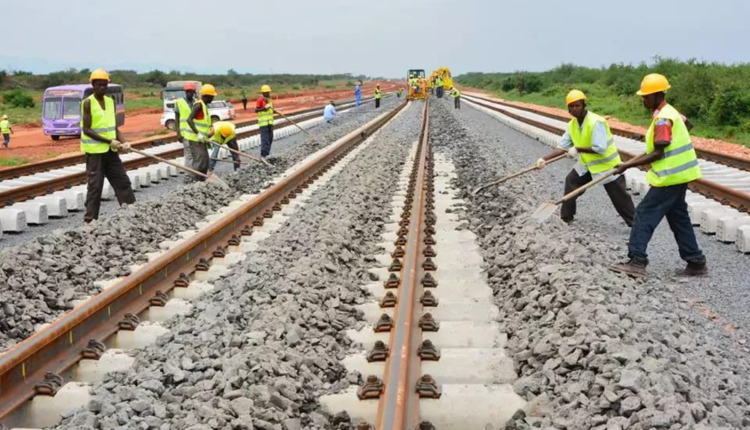From the chugging, grinding, and trombonic honking, which sometimes was irritating, but at the same time one that gave a sigh of relief to the market woman, that alas!, “the Zion train is coming my way”, to the squealing sound that brings it to a halt, a journey on the “keteke” (locomotive/train) had its own lyrics, a duet of balanced motion, the rails and wheels in tune.
From creating employment, an avenue for socialization, and most importantly, a means for transporting Ghana’s major trading commodities, such as minerals and cocoa, the railway sector has been a dominant part of Ghana’s economic activities. Reminiscent of the old school days, songs were even composed for the Railway industry, a testament of how relevant the sector was.
However, like the Titanic, slowly, Ghana’s railway industry started sinking with its entire value chain, including the then Railway Training School at Essikado, which later became defunct. Unfortunately, the sector had not seen the expected major improvement in the post-colonial era.
Current Situation
It is undeniable that the biggest intervention to revamping Ghana’s railway sector is the development of the Railway Master Plan, to construct a new railway network of 4,007.6 km, which is currently ongoing. Also, in order to receive maximum attention for its implementation, the Ministry of Railways Development was established in 2017.
However, the Ministry, among others, identified Human Resource Capacity as its main challenge. This was because, the Ministry did not have the full complement of staff knowledgeable in railways, a situation compounded by ageing staff of the Ghana Railway Company Limited, which has about 67% of staff aged 51-60 years, about 25% aged 41-50 years and about 5% aged 31-40 years.
The Partnership
A trite knowledge, which does not need elaboration, is the clarion call on academia and industry to partner in the training of industry-driven human capital and innovation transfer by institutions of higher learning.
But for a railway sector which had born the scars of neglect over decades, this was a mirage and that is why the following narrative is a very refreshing one that can stand the test of time.
In response, the Ministry of Railways Development in collaboration with the University of Mines and Technology (UMaT), Tarkwa, the only mining university in West Africa for the training of world-class professionals in the field of mining, petroleum, technology and related disciplines, established the School of Railway and Infrastructure Development (SRID) in 2020, out of the defunct Railway Training School (RTS), which was originally intended as a training school for the entire West African Sub-region.
The move is to address the human capacity challenges facing the sector by training people with the needed competencies to deliver quality services to the sector as part of the revamping process.
To fulfill its purpose as the railway industry manpower producer, the School currently runs certificate programmes in Locomotive Engineering, Signaling and Telecommunication, Rail Planning and Operations, Permanent Way Engineering, Geotechnical Technology, Survey and Mapping, Occupational Health and Safety, Plant and Maintenance Technology, Electrical and Electronics Technology. In addition, BSc programmes in Mechanical Engineering, Electrical and Electronic Engineering, Geomatic Engineering, Geological Engineering, Environmental and Safety Engineering, and Computer Science and Engineering are run in the School. BSc Transportation Management, and BSc. Civil Engineering are pending accreditation.
The uniqueness of these undergraduate and postgraduate programmes lies in the fact that all students, as part of their studies, are to take at least two compulsory courses in Introduction to Railways Engineering, Locomotive Engineering, Signaling and Telecommunication, and Rail Planning and Operations.
The Role of Research
Let me borrow the words of Albert Szent-Gyorgyi, the Hungarian-American Biochemist who said, “if I go out into nature, into the unknown, to the fringes of knowledge, everything seems mixed up and contradictory, illogical, and incoherent. This is what research does; it smooths out contradictions and makes things simple, logical and coherent”.
Thus, SRID of UMaT is not bereft of the needed research backing to ensure the highest quality of teaching and learning as the School continuously advance their knowledge through cutting-edge research.
First, the teaching faculty is made up of some of the finest brains in the various disciplines whilst AYA Engineering, Consultants to Ghana Railways, supports the School with industrial experts to support training, a blend of which results in rich content delivery during lectures
Second, with the establishment of the state-of-the-art Environmental Monitoring Laboratory (Analytical Chemistry Laboratory, Air Quality Laboratory, Water Quality and Waste Water Laboratory, Geotechnical Laboratory, Petrological Laboratory, Geophysical Laboratory and Mobile Laboratory), simulation, pneumatics and hydraulics labs, with drone services for aerial mapping, etc., students receive practical engineering training fit for the railway industry.
Challenges
In spite of the massive support from the Ministry of Railways Development by wholly renovating the existing infrastructure, SRID of UMaT is still grappling with teething challenges.
Topmost of the them are lecturers’ offices, inadequate student accommodation and the need for additional laboratory equipment related to the railway sector. The School currently is able to accommodate only 100 students on campus.
Therefore, the plea to funding organisations and stakeholders is that for such a strategic and critical institution in the railway service delivery value chain, every effort has to be made for UMaT-SRID, to be able to train the manpower needs for Ghana and the West African Sub-Region.
Writer: Michael Bremfi: Business Development Manager, (Assistant Registrar), University of Mines and Technology, Tarkwa.
Email: [email protected]


Comments are closed.